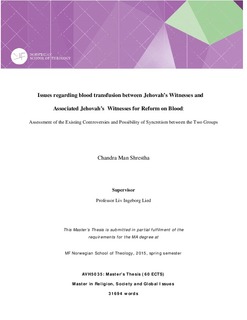Issues regarding blood transfusion between Jehovah’s Witnesses and associated Jehovah’s Witnesses for reform on blood : assessment of the existing controversies and possibility of syncretism between the two groups
Master thesis
Permanent lenke
http://hdl.handle.net/11250/285813Utgivelsesdato
2015-06-26Metadata
Vis full innførselSamlinger
Sammendrag
My thesis deals with the conflicts that exist between Jehovah’s Witnesses (JW) and Associated
Jehovah’s Witnesses for Reform on Blood (AJWRB) in relation to blood transfusion. JW is a
group that does not take blood transfusion even in life-threatening situations, and AJWRB is a
splinter group from the JW group that does not support the idea of refusing the blood transfusion.
The Witnesses justify their stand on the biblical scriptures where it is written that we cannot eat
blood as it is sacred and possesses life. The Witnesses also believe that if we receive blood in
any form, they will not achieve resurrection after the death whereas AJWRB believe that they
can achieve resurrection even after receiving the blood. In this thesis, my primary objective is to
explore the kinds of existing conflicts and to check the possibility of syncretism between them.
For the theoretical aspects in this thesis, I am using the “Actor-Network Theory” to gain a deeper
understanding of the existing conflicts as well as the notion of “modes of syncretism” developed
by John et al to locate the nature of possible syncretizing processes.
My research is based on the empirical study of the official websites of the JW and AJWRB
groups and their respective publications. They have been putting their views and arguments on
the websites and publishing brochures and journals to spread their respective standpoints about
the blood transfusion. In terms of the methodology, I am using the qualitative data analysis
where the texts are explored for its contents, and findings are discussed and analyzed
empirically.
In this thesis, I found not only the conflicts between them, but also that there are different modes
of syncretism that are already taking place. My conclusion from the research is that apart from
the main conflict regarding the blood transfusion, the two groups have engaged in many issues
such as interpretations of the Bible, blood components, blood card, Hospital Liaison Committees,
blood infections and diseases, disfellowship, overlapping of the rights of JW and doctors and
bloodless treatments. By comparison of the debates from these two groups, it is clear that their
logics of arguments and activities are already getting syncretized. Thus, syncretism is a
byproduct of their efforts to minimize the conflicts.
